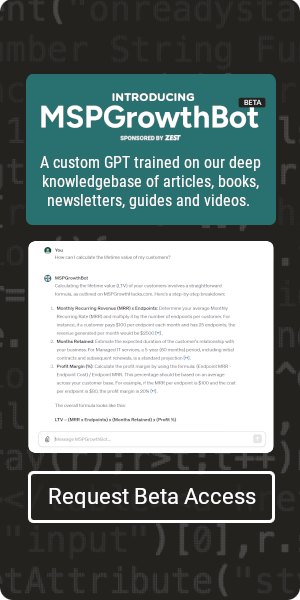Local Talent Shortages
Being an IT Technician for an MSP is not for the faint of heart. As a matter of fact, it’s a grind. Why? Well for starters, you have to log in everyday knowing that you will face problems that you’ve never seen before, and service customers that are already experiencing a high degree of stress. In my experience, the best team members are not necessarily the most technically trained, or well educated (although this helps). They are the people that have nerves of steel, and simply bring the right attitude to work everyday.
The problem that MSPs face today is that there are simply not a lot of these individuals out there in their immediate service area. Even the individuals that study computer science at a local community college, don’t necessarily know what an “MSP” is, and in many cases the path for them to transition into the industry is not always clear. This is why many get gobbled up by enterprise corporations as soon as they graduate, enjoying a comfortable entry-level salary in the “rank and file” of internal IT. As you can imagine, this is very difficult for small MSPs to compete with, which is why many have to look elsewhere for talent.
Remote Vs. Local
While some MSPs have simply looked outside of the industry, others have chosen to go remote instead. I recently spoke with Michael Nelson, an MSP and Founder of Scaled, who built a business entirely on this process. As he puts it, “While we valued local talent for L2 and L3 tech roles for their collaboration and community strengths, we faced a twofold challenge: not only was there a shortage of local techs, but many also lacked the advanced certifications crucial in specialized areas like cloud services and cybersecurity.
This wasn’t about the quality of local talent, but rather the quantity and specific skill sets we needed. Turning to the global market, we discovered a wealth of professionals who not only had these vital certifications but also brought diverse, hands-on experience. This strategy allowed us to blend local talent with the extensive expertise of international techs, creating a well-rounded, highly qualified team.”
Michael brings up a great point in the sense that specialization is even harder to come by locally. This is why he chooses to hire remotely for L2 and L3, while still relying on local talent to fill out his L1 support team. Most MSPs take the opposite approach (my own included), which is why I find his model to be quite compelling.
Investing In Education
The solution for many MSPs to incubate L1s has become clear. Find individuals that are a clear culture-fit, and arm them with the technical skills required to fill the role. To help me understand how MSPs are tackling this approach, I talked to Alex Farling, Co-Founder at Empath, an education platform for MSPs.
As he explains: “Talent is everywhere, opportunity is not. How many times have we found exceptional talent working in a manual labor job – or coming from a broken home having never graduated high school. The formal academic system has failed MSPs. but that doesn’t mean we can’t build our own educational model that delivers the kind of results that matter to MSPs.
MSPs have the cheat codes to success. They know exactly how to identify winning personality and aptitude. They just need the tools to enable those who lack knowledge to succeed. If they can do that, the sky’s the limit. After hundreds of conversations with MSPs about this problem, the team at Empath is excited to help them meet this challenge head-on.”
The Ultimate Guide To Cash Flow For Managed Services
Sponsored by Alternative Payments & Zest
Talent Incubation Programs
While Empath looks to be an affordable solution to a growing problem, education in itself can be an expensive endeavor. Like most things, the cost also increases the longer you wait to act. If you aren’t being proactive in building a pipeline of potential talent, then you will likely have to over-compensate for it later.
Here are a few examples of programs that you can implement to begin incubating talent in your local community long before you need it. Not only do these serve as great networking opportunities, but they can also be used to improve public relations and awareness of your company.
Guest Lectures
Guest lecturing in local colleges and technical schools can be a powerful tool for talent incubation. These “MSP 101” sessions allow MSPs to share their real-world experiences and insights directly with students, providing a practical perspective that complements the academic learning that they get in class. This can also be a way to introduce students to the latest industry trends, technologies, and practices, making the academic curriculum more relevant and up-to-date. This approach not only enriches the students’ learning experience but also helps in building a deeper understanding of the skills and knowledge required to participate in the MSP sector.
In addition to education, this is also an opportunity for MSPs to showcase their company and culture, effectively branding themselves as employers of choice in the local tech community. Through these interactions, MSPs can identify and engage with promising talent early on. Students get to know the company and its professionals, which can make them more inclined to consider a career with them upon graduation. Such early engagement is beneficial for building a pipeline of skilled individuals who are familiar with the company and potentially ready to hit the ground running.
Night Schooling
Night schooling initiatives can significantly contribute to developing technical talent locally for MSPs. By offering night classes tailored to working professionals or individuals looking to upskill, they can provide valuable training and education in specific technical areas that are in high demand within the MSP industry. These programs can be designed to cater to the needs of the local workforce, focusing on practical, hands-on training that directly correlates with the skills required on a day-to-day basis. By doing so, MSPs not only help in elevating the overall skill level of the local community but also create a pool of individuals who are more prepared and qualified for technical roles within their organization.
In addition to skill development, night schooling can also foster a strong relationship between the MSP and the local community. It demonstrates the MSP’s commitment to the professional growth of local individuals and their investment in the community’s economic development, beyond the individuals on the payroll. This positive community engagement can enhance the MSP’s reputation in a way that advertising simply cannot. This earned media opportunity alone can help justify the costs for such programs.
Certification Grants
Offering certification grants is another effective strategy for MSPs to nurture technical talent. These grants can cover the cost of certification exams and preparatory courses for individuals interested in acquiring specific technical skills and qualifications that are valuable in the MSP industry. In the IT industry, certifications are often seen as a hallmark of competence, and by facilitating access to these certifications, MSPs can help build a workforce that is more skilled and certified in relevant areas. This not only benefits the individuals who gain new qualifications and improve their employability but also benefits the MSPs by creating a larger pool of certified professionals from which to hire.
Certification grants can also help in breaking down the financial barriers that Alex mentioned, which often prevent talented individuals from acquiring professional certifications. By providing these grants, MSPs contribute to creating equal opportunities for learning and development in their local communities. This approach not only fosters goodwill, but it also helps to build a more income-diverse talent pool, which is incredibly important when looking for individuals with the qualities required to work an MSP Help Desk.
The Ultimate Guide To Cash Flow For Managed Services
Sponsored by Alternative Payments & Zest
Lab Sponsorships
Lab sponsorships involve MSPs providing financial or technical support to set up or enhance computer labs in local educational or community centers. In exchange for this service, these labs often take on the brand name of the company. By sponsoring such facilities, MSPs can ensure that students and community members get practical exposure and training in a controlled, real-world-like environment. This is especially important in technical fields where hands-on experience is as crucial as theoretical knowledge. Such labs can become breeding grounds for practical learning, innovation, and experimentation, helping individuals to acquire and refine the skills that are directly applicable in MSP-related roles.
Additionally, lab sponsorships allow MSPs to directly influence the curriculum and training environment to align with industry requirements. They can provide input on the setup of the labs, the technologies used, and the type of projects or experiments conducted. This ensures that the training provided is up-to-date and relevant to the needs of the MSP industry. They also position the MSP as a key contributor to the educational ecosystem, enhancing its reputation and relationship with educational institutions.
Internship Programs
Internship programs are probably one of the most direct methods for MSPs to incubate technical talent in their local communities. By offering internships, MSPs provide students or recent graduates with the opportunity to gain real-world experience in a professional setting. These programs allow interns to apply their academic knowledge in practical scenarios, understand the workings of the MSP industry, and develop technical and soft skills that are crucial for their professional growth. They also offer a ‘try before you buy’ experience for both the MSP and the intern; the company can evaluate the intern’s fit within their organization and culture, while the intern gets a firsthand look at what a career with the MSP would be like.
These programs can also be structured to identify and nurture high-potential individuals who could become future employees. MSPs can incubate young talent, instilling in them the company’s values and operational philosophies. This proactive approach to talent development ensures a pipeline of well-trained, culturally-aligned future employees who can contribute effectively to the MSP’s growth.
Conclusion
While remote workers are certainly an option, many MSP Owners that I have talked to over the years prefer to use local talent when available. This is why adding to the talent pool as a whole is so critical. The good news is, the labor market has always followed the economic principle of supply and demand. This means that if you are able to increase the supply of employable IT workers beyond the current demand, you will be able to hire them at a much more affordable rate. With such early access, you will also be front-running the competition, which saves a lot of money on poor hiring decisions or talent that simply doesn’t work out. For all of these reasons, I would encourage MSPs to implement at least one of these incubation programs, if not several.

SPONSORED BY ZEST

















